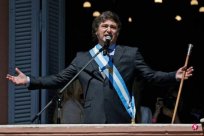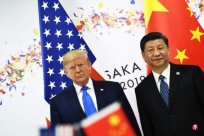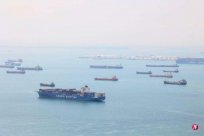
What is really famous for shock therapy is the practice of American economist Sax in Bolivia, with remarkable results.This lays a foreshadowing for the independent Russia's shock therapy.But for this reason, many people often attribute Russia's decline to shock therapy.People selectively ignore some successful cases.
The new Argentine President Mirley vowed to lead the country out of mud through a series of shock therapy economic reform measures.As part of the political commitment, he and his government recently promulgated economic laws covering more than 300 reform measures in one breath.
Argentina is in a serious economic crisis. The cumulative inflation rate has reached 142.7%in the past 12 months, and the poverty rate exceeds 40%.Argentina is also facing a debt crisis, and debt owned by the International Monetary Fund has exceeded $ 44 billion.Since the beginning of this year, the inflation rate has reached 8.4%in April. Some experts predict that this year's GDP in Argentina (GDP) will shrink 3.1%, and will shrink by 0.2%in 2024.
During the presidential presidential period, Miller has proposed a number of "surprising" policy solutions.Two days after the inauguration, Miller began to vigorously implement shock therapy, publishing a series of measures including reducing government expenditure, reducing consumer subsidies, and stopping the bidding of new public engineering, and quickly fulfilled campaign commitments to reduce fiscal deficit and control inflation.
But the situation does not seem optimistic.Comprehensive foreign media news, in the past two weeks, Argentina's national inflation has intensified.The New York Times reported on the 23rd that Merlie had been in office for two weeks, Argentina prices soared at a dazzling speed.In addition, more than 10 provinces in the country have announced their economic emergencies.People from all over the world have flooded on the streets to show their dissatisfaction with the new government.Judging from the New York Times report, Western public opinion does not seem to be optimistic about shock therapy.But my opinion is exactly the opposite of the mainstream view. Individuals have great hope for Mirley's shock therapy, because I have hope for shock therapy.
What is a shock therapy?
Shock therapy is a overall economics solution that proactively and suddenly relax price and monetary control by the state, reduce national subsidies, and quickly carry out trade liberalization.This type of plan is often accompanied by general public assets controlled by generals to carry out large -scale privatization measures.Due to the implementation of this economic program and policy, it has strong impact, which may have a huge shock in the economic life of society in the short term, and even a "shock" state. Therefore, people borrow medical terms as shock therapy.The earliest concept was the American economist Jeffrey Sachs.But what really practiced this concept is the Nobel Prize winner, American economist Milton Friedman and his student "Chicago Boys" -n a group of economists from Chilean.Essence
In 1970, the Chilean presidential election was elected with "the first socialism with democracy, diversification and freedom" as a model.After taking office, Alian began to be planned to be called "Chile's Socialism Road" on a large scale, and the policy center was land reform.This reform has been proceeded when the former President Frey was in power. The Frey government confiscated about one -five -quarters of the property that was easy to take over in the country.Land with a basic irrigation system.In addition, Alian hopes to provide work opportunities for poor people through the implementation of national or public engineering projects to improve the economic and social benefits of the most poor nationals.
In the first year of Aliande's term, with the cooperation of the extended monetary policy pursued by the Minister of Economic Minister, the economic situation was very happy.In the year, Chile's domestic GDP increased by 8.6%, and industrial growth reached 12%of rare.At the same time, the inflation rate also dropped from 34.9%before he took office to 22.1%, and the unemployment rate fell significantly to 3.8%.But in the following year, in 1972, Chile's inflation began to deteriorate sharply, from 22.1%to 140%, and it could not be controlled.At the same time, exports fell 24%, and imports rose 26%.
Faced with this situation, the strategy of the Aliande government's response is not from improving the production enthusiasm of enterprises and businessmen, increasing supply and controlling currency growth, but a stupid way to use frozen prices.This policy makes the price of rice, soybeans, sugar, and flour on the black market soaring, and these basic goods are not seen on the supermarket shelves.In August that year, in just one month, the price of basic consumer goods rose from 190 Escudo (Escudo, currency unit) to 421 Eskado.Although Aliande increased the wages of workers several times in 1970 and 1971, they were devoured by the continued rising prices.The living standards of the Chilean people have not been improved to match the increase in wages.
Malignant inflation and commodity shortage have caused the entire country to be confused, which has continued to accumulate people's grievances.In October 1972, the first wave of large -scale strikes after Aliande came to power and finally broke out.A large number of truck drivers and small businessmen, as well as some professional groups and student organizations on the streets of San Diego.This chaotic state provides soldiers with opportunities.In September 1973, the Chilean Army jointly launched a coup and killed the elected president Alian.However, the soldiers' governance economy was really layman. As a result, from 1973 to 1975, Chile's inflation soared all the way, the harm became worse, and the serious impact of the global economic atrophy, which led to the depression of Chilean economy and the people were not talking about life.
In this case, General Pinoches, the head of the Chilean military government at the time, found the "Chicago Boys" and let them fully responsible for Chile's economic reform.Under the deep -rooted national intervention, their work was not smooth at first.The military government was dissatisfied with the status quo, but they were concerned about their reforms.In order to reverse this situation, in March 1975, they invited the mentor of the University of Chicago from the United States.Consciousness foundation.
Friedman happily accepted the invitation and went to Chile to conduct a six -day public seminar.During this time, the master of the free market economy, cooperating with the Chicago boy's plan to vigorously preach his "therapy". It is suggested that the administrator's economic reform should not be dragged on the water, but should be a big sword, such as significantly reduced government expenses, let goPrice, cancellation of tariff protection, and attracting foreign capital injection, in order to stimulate the growth and expansion of the domestic industries in competition, and activate the economy.He particularly emphasized that in the face of problems, the governor should have the psychology of long pain.Friedman publicly acknowledged that using this method will definitely pay the price in the short term. If inflation may not fall immediately, the unemployment rate will inevitably increase.But just like quitting drug addiction, the economy will be reborn after surviving the pain period.
It is under this idea that Chile has launched reforms.After the initial extreme pain, the economy gradually recovered and showed strong growth.The inflation rate dropped from 700%in the mid -1974 period to less than 10%in the 1980s.The average annual economic growth rate from 1976 to 1980 was 8%.The actual salary and employment rate also rose rapidly, and the unemployment rate decreased significantly.From 1973 to 1995, in these 22 years, the actual per capita income of Chile has doubled.
Cases of self -salvation using shock therapy, as well as the United States in the early 1980s.At that time, the US President Reagan and the Federal Reserve President Volc, who took the initiative to use shock therapy: 1. Reduce government budget to reduce social welfare expenditures; 2. Reduce personal income tax and corporate taxes to stimulate investment;Cost; 4. Control the money supply to reduce inflationBloating.
Of course, the pain of the United States at that time was also unprecedented. The degree of economic recession was comparable to the depression -40%of small and medium -sized enterprises went bankrupt and 13%unemployed.But after 1979 to 1983, the United States not only came out of the failure of the 1970s, but also created a round of innovation by activating the devastating creative mechanism, allowing the United States to re -lead the world.
Bolivia Cases are well -known world
What really made shock therapy is well -known, but Sax's practice in Bolivia.In the mid -1980s, Sax was hired as an economic consultant of the Bolivian government.Due to the long -term political turmoil and economic policy, the economic problems caused by a large amount of economic problems were not resolved, which finally led to a serious economic crisis: in 1985, the Bolivian government budget deficit reached 4.859 trillion peso, accounting for total domestic product value.About one -third, the inflation rate is as high as 240 times.The foreign debt in 1984 was $ 5 billion, and the interest should be nearly $ 1 billion, exceeding export revenue.From 1980 to 1985, the living standards of residents of the country fell by 30%, and the national economy almost reached the edge of collapse.
Saxor, who was hired at the time of crisis, boldly proposed a set of economic projects and economic policies to the Bolivian government.Open prices and implement trade liberalization; 4. Corporate exchange rate stability through the depreciation of the currency; 5. Further reform the administrative and tax system, and privateization of some public departments and enterprises.
After the reform is implemented, the results are significant.After the extreme pain in the early days, Bolivia's situation has been greatly improved.First of all, the malignant inflation has been strongly curbed, and prices have stabilized from soaring.From 1986 to 1987, Bolivia's inflation rate dropped to 10%to 15%.Secondly, after a brief decline of the national economy, it soon began to rise gradually.The first year of shock therapy, that is, the GDP in 1986 fell 2.9%, but maintained a positive growth momentum of about 2.5%in the following years.At the same time, due to effective measures, debt issues were significantly relieved, and Bolivia eventually overcome the serious debt crisis.
This is the campaign, winning a high reputation for Sax, shock therapy has also renowned the world and attracted much attention from the world.This lays a foreshadowing for the independent Russia's shock therapy.But for this reason, many people often attribute Russia's decline to shock therapy.Since then, shock therapy has gradually been demonized.People selectively ignore the above -mentioned successful cases, selectively ignore Poland and Czech Republic that practice shock therapy almost in the same period as Russia; the latter's practice seems to be very successful.
The author is a Chinese economist and a financial columnist




